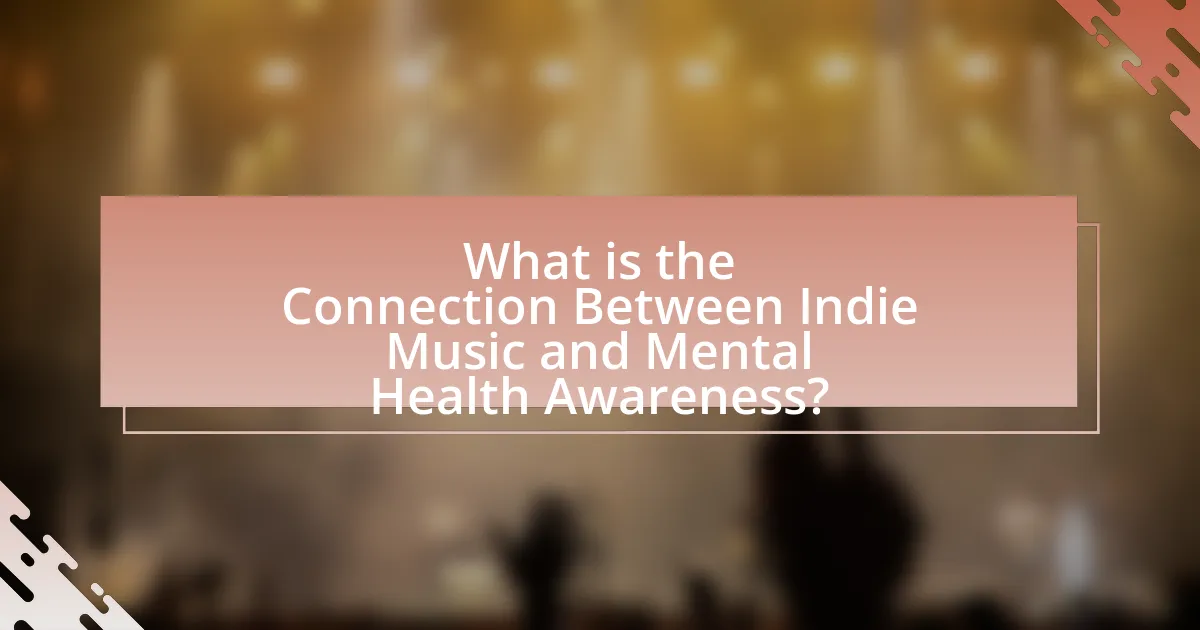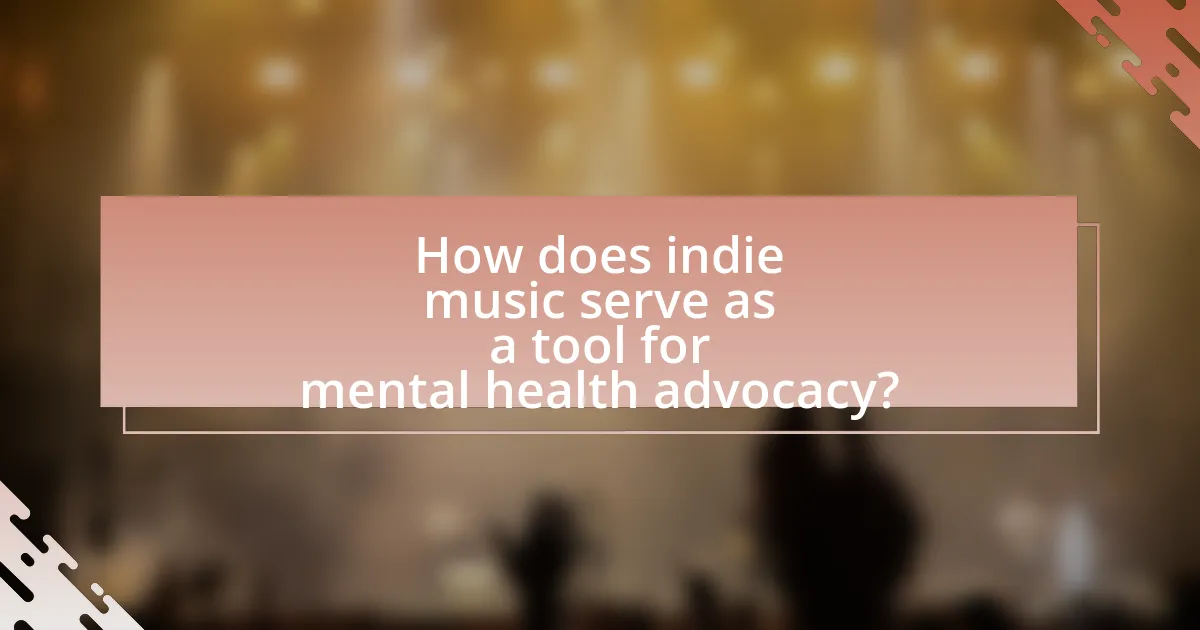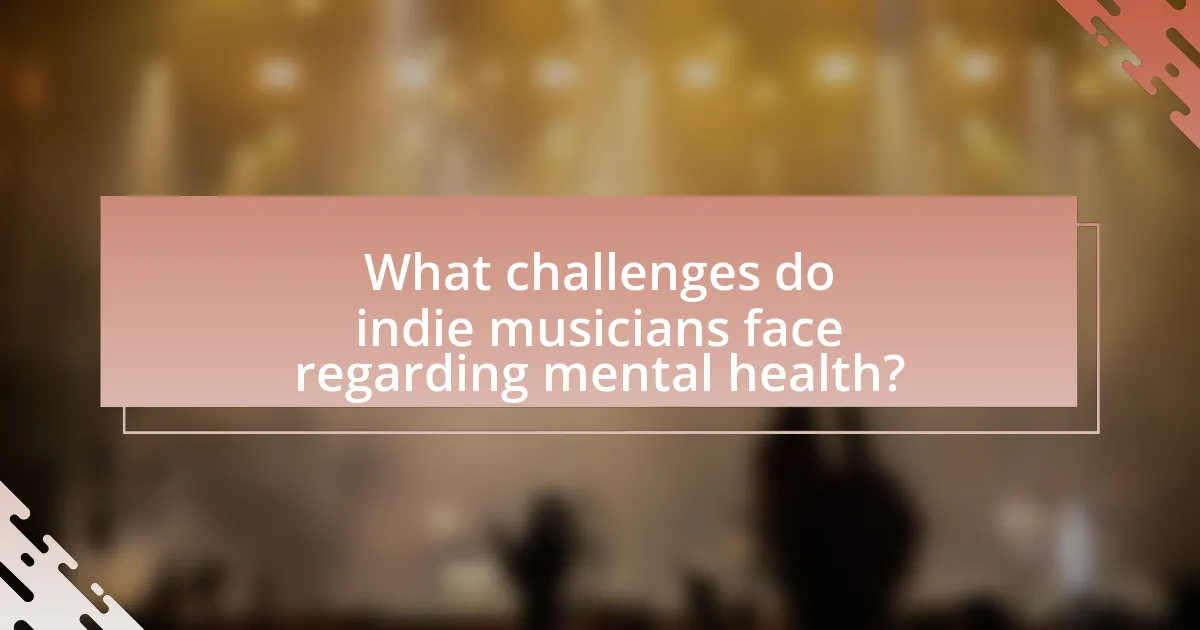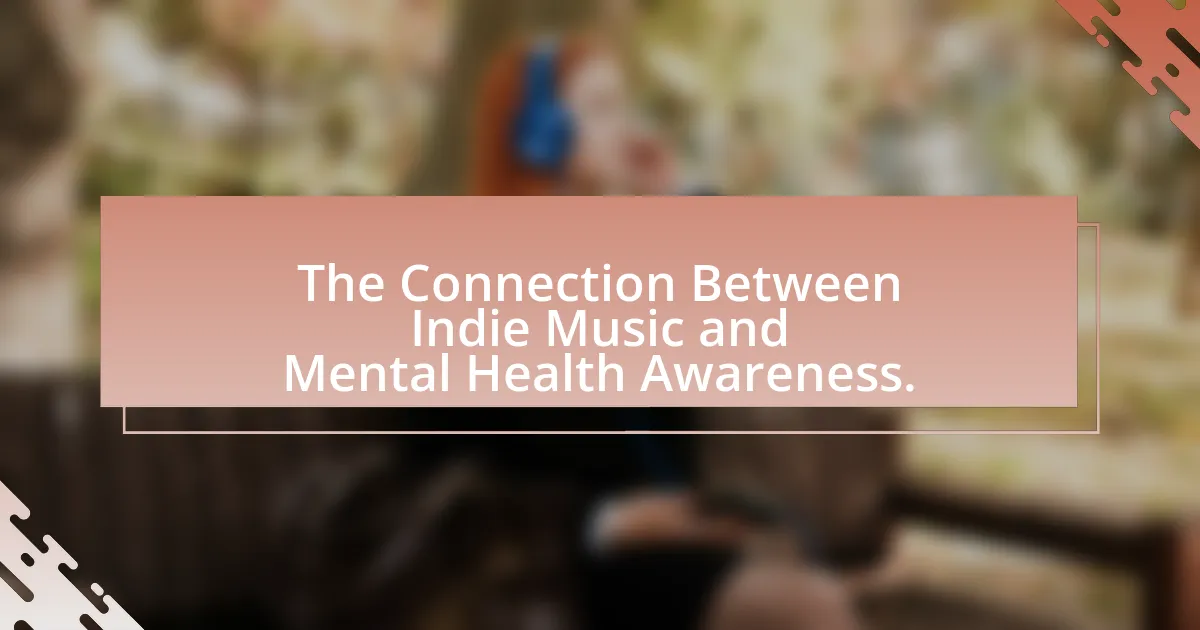The article explores the significant connection between indie music and mental health awareness, highlighting how indie artists use their platforms to address personal struggles with mental health issues such as anxiety and depression. It discusses the therapeutic effects of music, the role of indie musicians in promoting mental health discussions, and the importance of community support within the indie music scene. Additionally, the article examines various initiatives and partnerships that aim to raise awareness and provide resources for mental health, as well as the challenges faced by indie musicians in maintaining their mental well-being. Overall, it emphasizes the impact of indie music as both an artistic expression and a catalyst for mental health advocacy.

What is the Connection Between Indie Music and Mental Health Awareness?
Indie music significantly contributes to mental health awareness by providing a platform for artists to express personal struggles and emotions, fostering a sense of community among listeners. Many indie musicians openly discuss themes of anxiety, depression, and self-acceptance in their lyrics, which resonates with audiences facing similar challenges. For instance, studies have shown that music can serve as a therapeutic tool, with a 2016 study published in the Journal of Positive Psychology indicating that listening to music can enhance mood and reduce feelings of isolation. Additionally, events like mental health awareness concerts and festivals often feature indie artists, further promoting dialogue around mental health issues. This connection highlights the role of indie music not only as an artistic expression but also as a catalyst for mental health advocacy and support.
How does indie music influence mental health perceptions?
Indie music influences mental health perceptions by providing a platform for emotional expression and fostering community among listeners. The genre often addresses themes of vulnerability, anxiety, and personal struggles, which can resonate deeply with individuals experiencing similar issues. Research indicates that music can serve as a therapeutic tool; for instance, a study published in the Journal of Music Therapy found that engaging with music can reduce symptoms of depression and anxiety. Additionally, indie artists frequently share their own mental health journeys, which can normalize discussions around mental health and encourage listeners to seek help. This openness contributes to a broader cultural acceptance of mental health issues, ultimately shaping how society perceives and addresses these challenges.
What themes in indie music relate to mental health issues?
Indie music often explores themes such as anxiety, depression, isolation, and self-identity, which directly relate to mental health issues. Artists in this genre frequently use personal narratives and emotional vulnerability to address their struggles, creating a space for listeners to connect with their own experiences. For instance, songs that discuss feelings of loneliness or existential dread resonate with audiences facing similar challenges, thereby fostering a sense of community and understanding. Research indicates that music can serve as a therapeutic tool, with studies showing that listening to or creating music can alleviate symptoms of anxiety and depression, further validating the importance of these themes in indie music.
How do indie artists express their own mental health struggles through music?
Indie artists express their mental health struggles through music by creating deeply personal lyrics that reflect their experiences and emotions. These artists often use storytelling techniques to convey feelings of anxiety, depression, and isolation, making their struggles relatable to listeners. For instance, a study published in the Journal of Music Therapy found that music can serve as a therapeutic outlet, allowing artists to process their emotions and connect with audiences who may share similar experiences. This connection fosters a sense of community and understanding, highlighting the role of indie music in raising awareness about mental health issues.
Why is mental health awareness important in the indie music community?
Mental health awareness is crucial in the indie music community because it addresses the high prevalence of mental health issues among musicians and fans. Studies indicate that musicians experience mental health challenges at rates significantly higher than the general population, with a 2019 survey revealing that 73% of musicians reported experiencing anxiety or depression. This awareness fosters a supportive environment, encourages open discussions, and reduces stigma, ultimately promoting well-being and resilience within the community. By prioritizing mental health, the indie music scene can cultivate a culture that values emotional health, leading to healthier creative expressions and stronger connections among artists and audiences.
What role do indie musicians play in promoting mental health awareness?
Indie musicians play a significant role in promoting mental health awareness by using their platforms to address mental health issues in their lyrics and public discussions. Many indie artists openly share their personal struggles with mental health, creating a sense of community and reducing stigma around these topics. For instance, artists like Sufjan Stevens and Phoebe Bridgers have openly discussed their mental health challenges, which resonates with fans and encourages conversations about mental well-being. Research indicates that music can be a powerful tool for emotional expression and healing, further emphasizing the impact indie musicians have in fostering awareness and understanding of mental health issues.
How does the indie music scene foster a supportive environment for mental health discussions?
The indie music scene fosters a supportive environment for mental health discussions by prioritizing authenticity and vulnerability in its artistic expression. Artists within this genre often share personal experiences related to mental health, creating a relatable narrative that encourages listeners to engage in open conversations. For instance, many indie musicians openly discuss their struggles with anxiety and depression in their lyrics and interviews, which normalizes these topics and reduces stigma. Research indicates that music can serve as a therapeutic tool, with studies showing that listening to or creating music can alleviate symptoms of mental health issues. This connection between music and mental well-being is particularly evident in indie music festivals and community events, where safe spaces are created for fans to share their experiences and support one another.

How does indie music serve as a tool for mental health advocacy?
Indie music serves as a tool for mental health advocacy by providing a platform for artists to express personal struggles and promote awareness about mental health issues. Many indie musicians openly discuss their experiences with mental health challenges in their lyrics, fostering a sense of community and understanding among listeners. For instance, studies show that music can significantly impact emotional well-being, with genres like indie often addressing themes of anxiety, depression, and resilience. This connection encourages listeners to engage in conversations about mental health, reducing stigma and promoting acceptance. Additionally, events such as benefit concerts and collaborations with mental health organizations further amplify the message, demonstrating the genre’s commitment to advocacy and support for mental health initiatives.
What initiatives exist within the indie music community to support mental health?
The indie music community has several initiatives aimed at supporting mental health, including organizations like the Music Industry Therapist Directory, which connects musicians with mental health professionals, and the nonprofit organization Help Musicians UK, which provides mental health resources and funding for musicians in crisis. Additionally, many indie artists openly discuss their mental health struggles in their music and social media, fostering a culture of openness and support. Events such as the “Mental Health Music Festival” also raise awareness and funds for mental health charities, demonstrating the community’s commitment to addressing these issues.
How do music festivals and events raise awareness for mental health issues?
Music festivals and events raise awareness for mental health issues by integrating mental health initiatives into their programming and promoting open discussions among attendees. These events often feature mental health organizations that provide resources, support, and information, creating a platform for dialogue about mental health challenges. For example, festivals like Coachella and Glastonbury have included mental health awareness campaigns, offering workshops and informational booths that encourage attendees to engage with mental health topics. Additionally, artists and speakers at these events frequently share personal stories related to mental health, helping to destigmatize the conversation and foster a sense of community. This approach not only educates attendees but also encourages them to seek help and support, as evidenced by increased participation in mental health services following such events.
What partnerships have indie artists formed with mental health organizations?
Indie artists have formed various partnerships with mental health organizations to promote awareness and support for mental health issues. For instance, artists like Halsey have collaborated with the National Alliance on Mental Illness (NAMI) to raise funds and awareness through their music and social media platforms. Additionally, the organization Musicians on Call partners with indie musicians to bring live music to patients in healthcare facilities, emphasizing the therapeutic benefits of music. These collaborations not only provide financial support but also help destigmatize mental health discussions within the music community.
How can listeners benefit from indie music in relation to mental health?
Listeners can benefit from indie music in relation to mental health by experiencing emotional resonance and therapeutic effects. Indie music often features authentic lyrics and diverse sounds that can evoke feelings of connection and understanding, which are crucial for mental well-being. Research indicates that music can reduce symptoms of anxiety and depression; for instance, a study published in the Journal of Positive Psychology found that participants who engaged with music reported improved mood and emotional regulation. Additionally, the introspective nature of many indie songs allows listeners to reflect on their own experiences, fostering a sense of validation and support.
What therapeutic effects does listening to indie music have on mental health?
Listening to indie music can have several therapeutic effects on mental health, including reducing anxiety, enhancing mood, and promoting emotional expression. Research indicates that the introspective lyrics and diverse soundscapes often found in indie music can resonate with listeners, providing a sense of validation and connection. A study published in the Journal of Music Therapy found that participants who engaged with music, including indie genres, reported lower levels of stress and improved emotional well-being. Additionally, the unique and often personal nature of indie music allows individuals to explore their feelings and experiences, facilitating catharsis and self-reflection.
How can fans engage with indie music to improve their own mental well-being?
Fans can engage with indie music to improve their mental well-being by actively listening to and participating in the music community. Engaging with indie music allows fans to experience emotional resonance, as studies show that music can evoke feelings of happiness and reduce anxiety. For instance, research published in the Journal of Positive Psychology indicates that listening to music can enhance mood and promote relaxation. Additionally, attending live performances fosters social connections, which are crucial for mental health, as social support is linked to lower levels of depression and anxiety. By sharing their favorite indie tracks or artists on social media, fans can create a sense of community and belonging, further enhancing their mental well-being.

What challenges do indie musicians face regarding mental health?
Indie musicians face significant challenges regarding mental health, primarily due to financial instability, social isolation, and the pressures of self-promotion. Financial instability often leads to stress and anxiety, as many indie musicians lack a steady income and must juggle multiple jobs to support their music careers. Social isolation can exacerbate feelings of loneliness and depression, as the demanding nature of touring and performing can limit personal connections. Additionally, the pressure to constantly market themselves and their music can lead to burnout and heightened anxiety levels. Research indicates that musicians are at a higher risk for mental health issues, with a study published in the Journal of Psychiatric Research revealing that 71% of musicians experience anxiety and 68% report depression, highlighting the urgent need for mental health support within the indie music community.
How does the pressure of the music industry impact indie artists’ mental health?
The pressure of the music industry significantly impacts indie artists’ mental health by contributing to stress, anxiety, and feelings of inadequacy. Indie artists often face intense competition, financial instability, and the need for constant self-promotion, which can lead to burnout and depression. A study published in the Journal of Music Therapy found that musicians, including indie artists, experience higher rates of mental health issues compared to the general population, with 71% reporting anxiety and 68% experiencing depression. This data highlights the detrimental effects of industry pressures on their psychological well-being.
What are common mental health issues faced by indie musicians?
Common mental health issues faced by indie musicians include anxiety, depression, and burnout. These challenges often stem from the pressures of self-promotion, financial instability, and the emotional toll of creative expression. Research indicates that musicians are at a higher risk for mental health disorders compared to the general population, with studies showing that 73% of musicians experience anxiety and 68% report depression. The unique lifestyle of indie musicians, characterized by irregular schedules and isolation, further exacerbates these mental health issues.
How can the stigma surrounding mental health affect indie artists?
The stigma surrounding mental health can significantly affect indie artists by limiting their willingness to openly discuss their struggles and seek help. This reluctance can lead to increased isolation and exacerbate mental health issues, ultimately impacting their creativity and productivity. A study published in the Journal of Affective Disorders found that artists often experience higher rates of mental health disorders, yet the stigma can prevent them from accessing necessary support systems. Consequently, the stigma not only hinders personal well-being but also affects the overall artistic output and community engagement of indie artists.
What resources are available for indie musicians struggling with mental health?
Indie musicians struggling with mental health can access various resources, including mental health hotlines, support groups, and online therapy platforms. Organizations like MusiCares provide financial assistance and mental health support specifically for musicians, while the National Alliance on Mental Illness (NAMI) offers resources and education on mental health issues. Additionally, platforms like BetterHelp and Talkspace provide accessible online therapy options tailored for individuals in the music industry. These resources are crucial as studies indicate that musicians face higher rates of mental health challenges compared to the general population, emphasizing the need for targeted support.
What support networks exist for indie artists dealing with mental health challenges?
Support networks for indie artists dealing with mental health challenges include organizations like MusiCares, which provides financial and emotional support specifically for musicians, and the Music Industry Mental Health Coalition, which advocates for mental health awareness and resources within the music industry. Additionally, platforms like the Artist Mental Health Network offer community support and resources tailored for artists. These networks are essential as they address the unique pressures faced by indie artists, providing access to counseling, financial assistance, and peer support, which are critical for maintaining mental well-being in a high-stress industry.
How can indie musicians access mental health services effectively?
Indie musicians can access mental health services effectively by utilizing online platforms that offer affordable therapy options, such as BetterHelp and Talkspace, which provide licensed professionals through virtual sessions. These platforms have been shown to increase accessibility for individuals in creative fields, as they often face unique stressors related to their careers. Additionally, organizations like MusiCares offer targeted support for musicians, including mental health resources and financial assistance for therapy. Research indicates that musicians experience higher rates of mental health issues, making these tailored services crucial for their well-being.
What practical steps can indie musicians take to promote mental health awareness?
Indie musicians can promote mental health awareness by incorporating mental health themes into their music and lyrics. This approach allows them to address personal experiences and societal issues related to mental health, fostering open conversations among listeners. For instance, artists like Logic have successfully raised awareness through songs like “1-800-273-8255,” which directly references suicide prevention and has been linked to increased calls to crisis hotlines. Additionally, indie musicians can host workshops or panel discussions at their shows, creating safe spaces for dialogue about mental health. Collaborating with mental health organizations for events or campaigns can further amplify their message, as seen in partnerships between musicians and groups like NAMI (National Alliance on Mental Illness). By using their platforms to share resources and personal stories, indie musicians can effectively contribute to reducing stigma and promoting mental health awareness.
How can artists incorporate mental health themes into their music and performances?
Artists can incorporate mental health themes into their music and performances by addressing personal experiences, using relatable lyrics, and creating immersive experiences that resonate with audiences. For instance, artists like Billie Eilish and Logic have openly discussed their struggles with mental health in their songs, which not only raises awareness but also fosters a sense of community among listeners who may share similar experiences. Research indicates that music can serve as a therapeutic tool, with studies showing that engaging with music can reduce anxiety and improve emotional well-being. By integrating mental health narratives into their work, artists can contribute to destigmatizing mental health issues and promoting open conversations, ultimately enhancing the emotional connection with their audience.
What best practices can indie musicians follow to maintain their own mental health?
Indie musicians can maintain their mental health by establishing a balanced routine that includes regular breaks, physical exercise, and social interactions. Research indicates that engaging in physical activity can reduce symptoms of anxiety and depression, which are common in the music industry. Additionally, setting realistic goals and managing expectations can help mitigate stress, as unrealistic aspirations often lead to burnout.
Practicing mindfulness and meditation has been shown to improve emotional regulation and reduce stress levels, making it a valuable tool for musicians. Furthermore, seeking support from peers or mental health professionals can provide essential coping strategies and foster a sense of community, which is crucial for emotional well-being.
In summary, indie musicians should prioritize a balanced lifestyle, incorporate physical activity, practice mindfulness, and seek social support to effectively manage their mental health.

![The Role of Social Media in [Band Name]’s Rise to Fame](https://therooksband.com/wp-content/uploads/Featured-image-The-Role-of-Social-Media-in-Band-Names-Rise-to-Fame-150x150.webp)